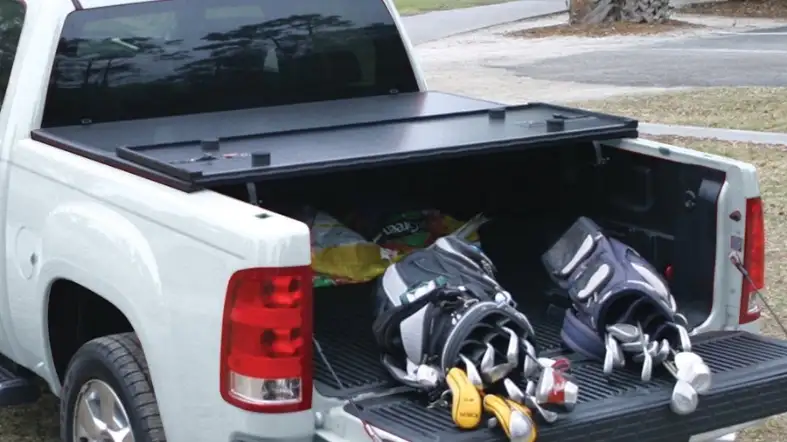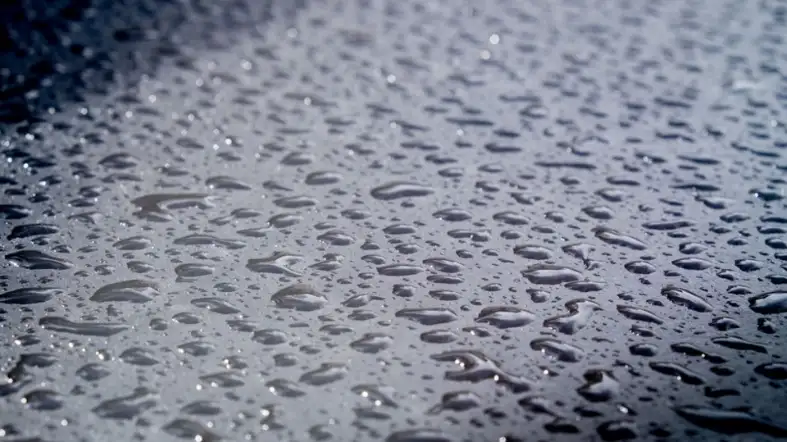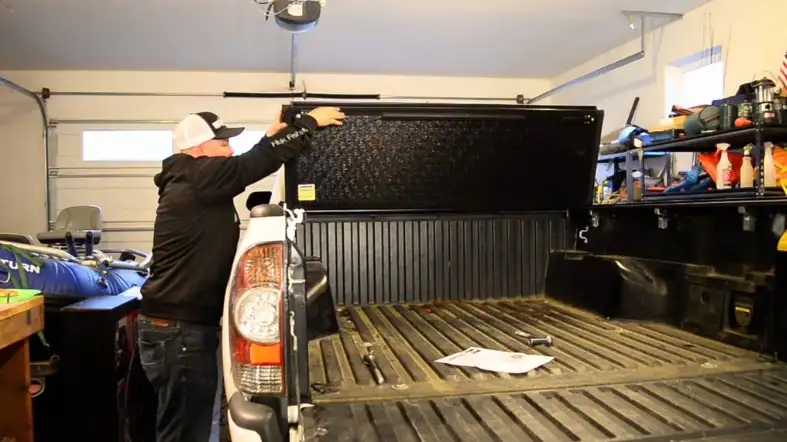Are you curious to know how much weight an undercover tonneau cover can hold?
When it comes to protecting your truck bed and securing your cargo, the weight capacity of the tonneau cover plays a crucial role.
Get ready to discover the ultimate strength of these covers and learn how they can handle your hauling needs.

How Much Weight Will An Undercover Tonneau Cover Hold?
The weight capacity of an undercover tonneau cover can vary depending on the specific model and design. Generally, these covers are designed to hold a maximum weight of around 300-600 pounds. However, it is important to note that the weight capacity of the cover should not be exceeded.
Here is a chart of the weight capacity for Undercover tonneau cover models:
| Model | Weight Capacity |
|---|---|
| Classic | 500 lbs |
| SE | 500 lbs |
| Elite | 500 lbs |
| Elite LX | 500 lbs |
| ArmorFlex | 600 lbs |
| Ultra Flex | 600 lbs |
| Flex | 400 lbs |
| Triad | 500 lbs |
It is important to note that these weight capacities are for evenly distributed loads.
Understanding the Strength of Undercover Tonneau Covers
Factors that contribute to the strength of undercover tonneau covers:
Material Composition
Undercover tonneau covers are constructed using different materials, each with its own unique properties.
Common materials used include aluminum, fiberglass, and high-quality plastics. Aluminum tonneau covers are lightweight, yet they offer excellent strength and resistance to external pressures.
Fiberglass tonneau covers, on the other hand, provide exceptional impact resistance and durability.
High-quality plastics are also utilized in some tonneau covers, providing a balance between strength and weight.
Understanding the characteristics of these materials will help you gauge the overall strength and performance of the tonneau cover.
Frame Construction
The frame of an undercover tonneau cover plays a significant role in its strength and stability.
Look for covers that feature reinforced frames, typically made from aluminum or steel, as they provide enhanced rigidity.
Reinforced frames ensure that the tonneau cover can withstand external pressures, such as heavy snow or strong winds, without sagging or deforming.
Additionally, some tonneau covers incorporate support beams or crossbars, which distribute weight evenly and further enhance the overall strength of the cover.
Hinge System
The hinge system is another critical component contributing to the strength of an undercover tonneau cover.
High-quality tonneau covers often feature robust hinges that can withstand frequent opening and closing without weakening or becoming loose.
Look for covers with durable, corrosion-resistant hinges to ensure long-lasting strength and reliability.
Latching Mechanism
The latching mechanism of an undercover tonneau cover secures it in place and prevents unauthorized access to your truck bed.
A strong and reliable latching system ensures that the cover remains securely closed, even during rough driving conditions or when subjected to external forces.
Opt for tonneau covers with sturdy and secure latches to guarantee the overall strength and security of the cover.
Weight Capacity
While tonneau covers are not designed to bear heavy loads directly, they should have a sufficient weight capacity to handle everyday items and withstand mild impacts.
Manufacturers typically provide weight capacity specifications for their tonneau covers.
Consider the weight capacity recommended by the manufacturer to ensure that it aligns with your needs.
It’s important to note that exceeding the weight capacity may compromise the structural integrity of the cover and lead to premature damage.
Installation and Mounting
Proper installation is crucial for maximizing the strength and performance of your undercover tonneau cover.
Follow the manufacturer’s instructions carefully and ensure that all mounting points are securely fastened.
A properly installed tonneau cover will remain stable, minimizing the risk of it coming loose or affecting its strength.
What Materials Are Used To Make Undercover Tonneau Covers?
Here are some materials that are used to make undercover Tonneau covers:
Aluminum
Aluminum is a popular choice for tonneau covers due to its lightweight yet sturdy nature.
It offers an exceptional strength-to-weight ratio, making it ideal for tonneau cover construction.
The aluminum used in these covers is typically aircraft-grade, ensuring optimal resilience against various weather conditions and providing long-lasting protection for your truck bed.
Additionally, aluminum covers are resistant to corrosion, rust, and UV rays, making them suitable for extended outdoor use.
Fiberglass
Fiberglass is another prevalent material used in the production of undercover tonneau covers.
It is a composite material composed of fine glass fibers embedded in a resin matrix.
Fiberglass covers offer a sleek and smooth appearance that complements the overall aesthetics of your truck.
They are known for their exceptional durability, impact resistance, and ability to withstand extreme temperatures.
Fiberglass tonneau covers are often painted to match the color of your vehicle, creating a seamless and stylish look.
Vinyl
Vinyl, a synthetic material, is commonly used in tonneau cover construction. It is known for its flexibility, weather resistance, and cost-effectiveness.
Vinyl covers are lightweight, easy to install, and provide protection against various elements such as rain, snow, and UV rays.
While they may not offer the same level of durability as aluminum or fiberglass covers, vinyl tonneau covers are an excellent option for those seeking a budget-friendly solution without compromising functionality.
ABS Plastic
ABS (Acrylonitrile Butadiene Styrene) plastic is a durable and impact-resistant material used in the manufacturing of tonneau covers.
It provides a balance between strength and weight, making ABS covers suitable for everyday use.
These covers are known for their resistance to scratches, dents, and fading caused by prolonged exposure to sunlight.
ABS tonneau covers often feature a textured finish, adding a touch of ruggedness to your truck’s appearance.
Composite
Composite tonneau covers combine various materials, such as fiberglass, plastic, and aluminum, to achieve a balance of strength, weight, and aesthetic appeal.
These covers offer the advantages of each material while mitigating their individual drawbacks.
Composite covers often provide a lightweight design, resistance to harsh weather conditions, and enhanced security for your truck bed.
Are Undercover Tonneau Covers Waterproof?

When it comes to undercover tonneau covers, you may wonder if they provide waterproof protection for your truck bed.
The answer to this question depends on the specific type of tonneau cover you choose.
Hard Folding Tonneau Covers
Hard folding tonneau covers are known for their durability and security. They typically consist of rigid panels that fold up to provide access to your truck bed.
While these covers offer excellent protection against rain and snow, they may not be entirely waterproof.
Although the panels themselves may be designed to repel water, there may be small gaps or seams where water could potentially seep through during heavy rainfall or when exposed to significant amounts of water.
It’s important to note that most hard folding tonneau covers provide high water resistance but may not guarantee complete waterproofing.
Soft Roll-Up Tonneau Covers
Soft roll-up tonneau covers are made from a durable fabric material, often with a vinyl or canvas construction.
These covers feature a roll-up design that allows easy access to your truck bed.
While they offer convenience and protection against various elements, including light rain and snow, they are not typically considered fully waterproof.
The fabric used in soft roll-up covers may repel water to some extent, but during heavy rain or prolonged exposure to water, there is a possibility of water finding its way into the bed due to the nature of the cover’s design.
Hard Retractable Tonneau Covers
Hard retractable tonneau covers are constructed with rigid panels that retract into a canister at the front of your truck bed.
These covers provide a sleek and streamlined appearance while offering enhanced security and protection.
Like hard folding covers, hard retractable covers may have small gaps or seams where water could enter during heavy rainfall or when exposed to significant amounts of water.
While they offer good water resistance, they may not be completely waterproof.
Soft Tri-Fold Tonneau Covers
Soft tri-fold tonneau covers are made from a durable fabric that folds into three sections, allowing easy access to your truck bed.
These covers offer a balance between convenience, affordability, and protection. While they provide resistance against light rain and snow, they are not typically designed to be fully waterproof.
Similar to soft roll-up covers, water may find its way into the bed during heavy rain or prolonged exposure to water.
How To Install An Undercover Tonneau Cover By Myself?

Here is how to install an undercover Tonneau cover by yourself:
Prepare the Tools and Equipment
To begin installing your undercover tonneau cover by yourself, gather all the necessary tools and equipment beforehand.
You will typically need a socket set, a screwdriver (Phillips or flathead, depending on the cover’s design), a measuring tape, and a clean cloth for wiping down surfaces.
Clean and Clear the Truck Bed
Start by thoroughly cleaning and clearing your truck bed. Remove any debris, dirt, or existing accessories from the bed.
Take a clean cloth and wipe down the bed surface, ensuring it is free from dust, moisture, or any substances that could affect the adhesion or installation process.
Assemble the Tonneau Cover (If Required)
Depending on the specific tonneau cover you have purchased; it may require some assembly before installation.
Follow the manufacturer’s instructions carefully to assemble the cover components. This could involve connecting the rails, hinges, or any additional parts.
Make sure to tighten all screws or bolts securely according to the provided specifications.
Position the Rails
With the cover assembled, position the tonneau cover rails onto the truck bed.
Align them with the sides of the bed, ensuring they are evenly spaced and parallel to each other.
Take your measuring tape and confirm the alignment, making any necessary adjustments for a precise fit.
Secure the Rails
Once the rails are properly positioned, secure them to the truck bed. Depending on the tonneau cover model, this may involve using clamps, brackets, or bolts.
Follow the manufacturer’s instructions to attach the rails securely, ensuring they are tightly fastened.
This step is crucial to prevent any movement or shifting of the rails during use.
Install the Cover Panels
Now it’s time to install the cover panels onto the rails. Depending on the design of your tonneau cover, this step may require sliding the panels into the rails or attaching them using hinges or latches.
Refer to the manufacturer’s instructions and carefully follow the provided guidelines to ensure proper installation.
Take your time to align the cover panels correctly and ensure a snug fit.
Check and Adjust
After installing the cover panels, it’s important to check their alignment and overall fit.
Verify that the tonneau cover sits flush on the truck bed and that all components are securely fastened.
Make any necessary adjustments to ensure a proper fit and optimal functionality of the tonneau cover. This will contribute to its overall performance and longevity.
Test the Cover
Once you have completed the installation, it’s time to test the tonneau cover to ensure everything is functioning as expected.
Open and close the cover multiple times, paying attention to how it moves and locks into place.
Confirm that all latches or locking mechanisms operate correctly and that the cover provides the desired level of security and protection for your truck bed.
Are Tonneau Covers Able to Support Heavy Loads?
Tonneau covers play a vital role in protecting and securing the cargo in pickup trucks, but can they handle heavy loads? The answer lies in adjusting tension on tonneau covers. By correctly adjusting the tension, these covers can effectively support heavy weights, ensuring the safety and stability of your cargo during transportation. So, make sure to properly maintain and adjust the tension on your tonneau cover to maximize its load-bearing capabilities.
Frequently Asked Question
Can I Use My Tonneau Cover As A Platform For Heavy Objects?
While tonneau covers can handle a significant weight load, it is not recommended to use them as a platform for heavy objects or to exceed the manufacturer’s weight capacity guidelines.
Will The Weight Of Snow Or Rain Cause Damage To The Tonneau Cover?
Undercover tonneau covers are designed to withstand typical weather conditions, including the weight of snow or rain.
However, it’s important to regularly remove excessive snow accumulation to prevent any potential strain on the cover.
Are There Any Weight Restrictions For Driving With The Tonneau Cover Closed?
No, there are typically no weight restrictions for driving with the tonneau cover closed.
As long as the cover is securely fastened and latched, you can drive with confidence.
Can I Load My Tonneau Cover With Tools Or Equipment?
Yes, you can load your tonneau cover with tools or equipment within the weight capacity guidelines.
Just ensure that the weight is distributed evenly and does not exceed the recommended limits.
Will The Weight Of The Tonneau Cover Affect My Fuel Efficiency?
The weight of the tonneau cover itself is minimal and generally does not have a significant impact on fuel efficiency.
However, adding heavy cargo or excessive weight on top of the cover may slightly affect fuel consumption.
Can I Transport A Motorcycle Or ATV On Top Of The Tonneau Cover?
Transporting motorcycles or ATVs directly on top of a tonneau cover is not recommended.
Tonneau covers are not designed as load-bearing surfaces, and the weight and movement of such vehicles can cause damage to both the cover and the truck bed.
It’s best to use appropriate trailers or carriers for safely transporting motorcycles and ATVs.
Final Words
Now you know the impressive weight-holding capabilities of undercover tonneau covers.
With their sturdy construction and load-bearing design, these covers can support a distributed weight load of up to 500 lbs or more.
Whether you’re hauling tools, equipment, or supplies, you can trust that your tonneau cover will provide the strength and durability you need.
